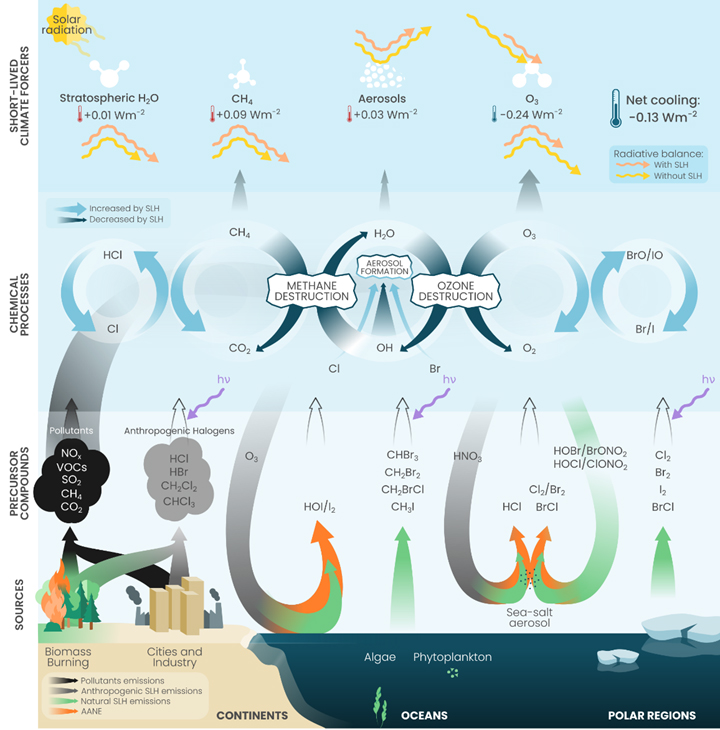Emissions of several oceanic compounds cool the climate, but do not offset warming
The Institute of Astrophysics of Andalusia (IAA-CSIC) is participating in a study that highlights the influence of a series of compounds emitted by the ocean on the Earth's climate. The scientific team, which stresses that this effect does not counteract the warming produced by human emissions, emphasises the need to include it in climate models to improve their predictions
A new study published in Nature shows that a series of compounds emitted by the ocean, the short-lived natural halogens, have an indirect cooling effect on Earth's climate. This mechanism, which arises from complex chemical reactions that modify the energy balance in the atmosphere, has been amplified since the beginning of the industrial era as a consequence of human emissions, which in turn have increased oceanic emissions of halogens. The work shows that this effect does not compensate for human-induced global warming since pre-industrial times, although it should be included in climate models to more accurately reproduce the observed increase in global temperature and improve projections of future scenarios.
The climatic significance of gas exchange between the ocean and the atmosphere has focused mainly on the exchange of greenhouse gases, such as carbon dioxide, methane and nitrous oxide. Less attention has been given to oceanic emissions of reactive gases to the atmosphere, where they initiate chemical reactions that can indirectly affect the Earth's radiative balance and climate.
One such group of reactive gases are the so-called short-lived halogen compounds, or SLHs, which are compounds of chlorine, bromine and iodine with a lifetime of less than six months in the atmosphere. These molecules are naturally emitted from the oceans, polar ice and the biosphere, and over the past two decades measurements have shown their ubiquitous presence in the global atmosphere.
The study used a state-of-the-art earth system model to quantify the contribution of short-lived halogens to the global energy balance in pre-industrial, current and future climates. "Our results show that SLH emitted by the ocean exerts an indirect cooling effect on the climate system and that this natural cooling effect has been amplified since the beginning of the industrial era driven by anthropogenic activity", explains Alfonso Saiz-López, a researcher at the Blas Cabrera Institute of Physical Chemistry (CSIC) and lead author of the paper.

The work highlights that the net indirect cooling caused by SLH is the result of a trade-off between various cooling and warming effects of halogens, mainly on ozone and methane, with a minor contribution from aerosols and stratospheric water vapour. The study demonstrates that ocean-initiated atmospheric chemistry plays a role in the partial mitigation of anthropogenic warming.
"Global warming is, however, much larger than this cooling, which is a rather small part of the large warming induced by human emissions", stresses Alfonso Saiz-López (IQFR-CSIC). On the contrary, "this work seeks to reduce the uncertainties in the different contributions to the radiative balance of the Earth's atmosphere, and demonstrates that the global warming induced by human action is so large that it cannot be compensated by natural mechanisms", says Juan Carlos Gómez Martín, a researcher at the Instituto de Astrofísica de Andalucía (IAA-CSIC) who participates in the work.
This hitherto unrecognised interaction between SLH and the Earth's radiative balance is non-linear in past, present and future climates, and is determined by a combination of natural and anthropogenic emissions, climate variability and atmospheric chemistry.
A. Saiz-Lopez et al. Natural short-lived halogens exert an indirect cooling effect on climate. Nature, June 2023 DOI: 10.1038/s41586-023-06119-z
Instituto de Astrofísica de Andalucía (IAA-CSIC)
Unidad de Divulgación y Comunicación
Silbia López de Lacalle - sll[arroba]iaa.es - 958230676
https://www.iaa.csic.es
https://divulgacion.iaa.csic.es

